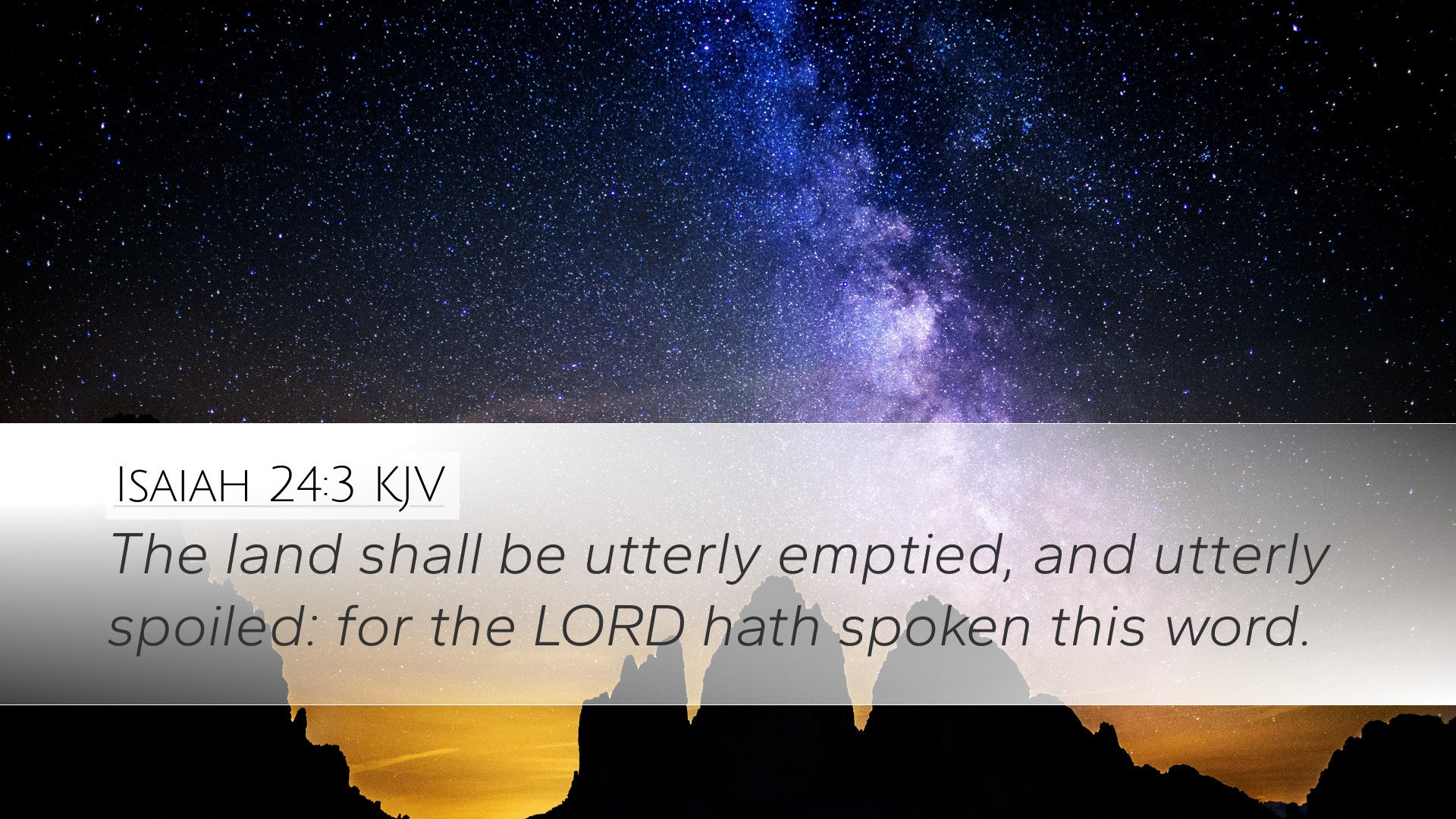Commentary on Isaiah 24:3
Isaiah 24:3 states: “The land shall be utterly emptied, and utterly spoiled: for the Lord hath spoken this word.” This passage presents a profound portrayal of judgment and desolation
that can be examined through the insights of esteemed biblical commentators. Each contributor adds layers of meaning, offering a comprehensive understanding for pastors, students,
theologians, and scholars.
Contextual Overview
The Book of Isaiah addresses the socio-political and spiritual state of Judah and Jerusalem, shining light on divine judgment as a response to rampant sin and moral decay.
Isaiah 24 captures a universal theme—the impending judgment not only upon Judah but also on the entire earth, emphasizing God’s sovereignty over the nations.
Theological Implications
As we delve into Isaiah 24:3, it is crucial to acknowledge the theological implications of “the Lord hath spoken this word.” This phrase reflects God’s decisive authority and
the certainty of His declarations. The commentators emphasize the weight of this proclamation, reminding readers that God’s words are not idle; they are powerfully effective.
Matthew Henry's Insights
According to Matthew Henry, this verse symbolizes the complete and utter destruction wrought by divine judgment. Henry notes that when God speaks of the ruin of a nation or people,
it is absolute, highlighting the seriousness of sin and the consequences that arise from turning away from God.
He emphasizes that such desolation serves not merely as punishment but as a wake-up call for repentance and returning to divine principles.
Albert Barnes' Commentary
Albert Barnes elaborates further on the nature of this utter devastation. He argues that it signifies not just physical desolation, but also spiritual desolation.
The “land” mentioned here is indicative of both the literal earth and the people inhabiting it, signaling a complete disarray in societal order.
Barnes notes that the desolate state is a direct result of the people’s abandonment of God’s commandments and the natural consequences of their sins.
He emphasizes the global significance of this judgment, indicating it poses lessons applicable to all nations and peoples today.
Adam Clarke's Explanation
Adam Clarke approaches the verse with an eye toward the historical context. He sees this utter devastation as a reflection of God’s dealings with His covenant people,
warning them of the dire results of their unfaithfulness. Clarke points out that “utterly spoiled” conveys a sense of complete ruin, where nothing of value remains.
His interpretation invites readers to recognize the gravity of divine warnings and to examine their own hearts in light of God’s judgments.
Applications for Today
This verse holds critical applications for contemporary believers. Pastors can reflect upon this passage as a strong reminder of God’s holiness and judgment,
challenging congregations to pursue righteousness in an often morally ambiguous world. The urgent tone serves as an admonition to assess one’s spiritual condition—are we living in alignment with God’s word?
- Call to Repentance: Understanding the implications of sin and its consequences can prompt personal and communal repentance.
- Divine Sovereignty: Recognizing God’s control over history fosters a sense of trust amidst chaos.
- Hope in Restoration: The narrative also points to the hope of restoration following judgment, suggesting that repentance opens the door to healing.
Conclusion
Isaiah 24:3 serves as a powerful reminder of divine judgment and the call for repentance. By weaving together insights from Matthew Henry, Albert Barnes, and Adam Clarke,
we uncover a multifaceted understanding of God’s intentions behind this proclamation. The emptiness spoken of serves to remind us of what is at stake when we stray from God’s ways—
urging us, as modern-day readers and believers, to uphold the values and teachings of Scripture, ensuring that our lives and communities reflect His glory.


